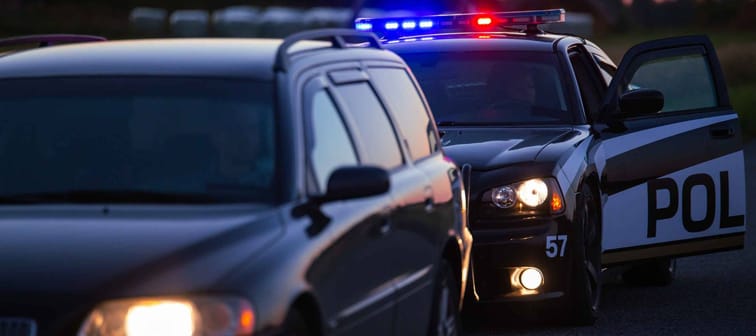It’s not the fine, it’s the insurance hit
The actual cost of the ticket should not be your primary concern. The far greater consideration is that your insurance costs will rise. Young people already pay the highest insurance rates since they are seen as a bigger liability, so a ticket or two can really jack up the monthly amount taken out of your bank account. It’s these costs that add up faster than a $200 slap on the wrist for a traffic infraction.
So how do speeding tickets affect insurance rates? Most are considered minor offences and will cause a 10% spike, while a more major infraction, like speeding in a construction zone, can result in a 25% hike. Your insurer will only be notified of a speeding ticket if you pay it, decide not to fight it or are found guilty by the court. However, any infraction that results in a license suspension can cause insurance premiums to rise by 100%.
Why just showing up won’t always cut it
The hit to your insurance is also why you should rarely take a plea deal when you fight a ticket. Just for showing up in court, the judge will likely offer you 50% off the ticket if you plead guilty and save the court time and energy (our courts are generally so backed up that this is considered a good deal for them). Don’t take this offer. While you may pay as little as $30 or $40 upfront, it will likely still affect your insurance since you will still have demerit points. The cop, judge and prosecutor may try to pressure you to take a plea deal, but stand your ground and fight it.
However, if you are tagged by a red light traffic camera, just pay the fine instead of going to court and pleading your case. That's because red light traffic camera infractions can’t be held against you by your insurance provider since no one can prove it was you driving. (The camera catches your car and sends the bill to whomever it was registered to.) Fighting a red light camera ticket is a lot more difficult, and it’s not worth it in terms of the cost versus the benefit. Most people are probably better off paying the fine and moving on in this case, since your insurance company won’t be involved, and your rate should remain the same.
Fighting the traffic ticket
So you got a ticket for going 10% over the speed limit and the officer was not empathetic to your case, what are your best options if you want to dispute it? Here are some possible strategies. Some of the rules do differ slightly by province, but the broad process is generally applicable everywhere.
Step 1: You’ll win some of the time just by showing up in court
When you decide to take a day off of work and go down to the court, there is a decent chance the police officer who issued you the traffic ticket won’t be able to make it for a variety of reasons (sick, vacation, got tied up with something else, etc.). As long as your offence wasn’t serious, this is almost always an automatic win.
Step 2: Immediately request disclosure
After filing for a court date (the details usually will be on the ticket for how to do that), you’ll eventually receive a letter telling you when your court date is. At this point, file for disclosure, but do this ASAP, as procrastinating can give the court some leverage. Requesting disclosure means that the officer's notes will have to be presented to you before the hearing. Some law enforcement officers take excellent notes. Others don’t.
If an officer’s notes are inconsistent as to where the infraction was, what you were charged with, specifics about your car, or several other details, these omissions or errors might be enough to win the case. Worst case scenario, you still need to know what evidence there is against you to fight the charge.
Moreover, if your ticket was given based on a radar gun reading, ask for a copy of the calibration records to be disclosed as well. Sometimes you can get lucky and the calibration will invalidate the whole case.
Finally, if an officer’s notes are not legible, you can ask for a typed version at the trial and request an adjournment on that basis. Even if they’re of bad quality, this dramatically improves the chances of the judge throwing the case out. Remember, it’s all a numbers game. Police officers don’t want to be tied down with someone who was 9 km over the speed limit. Finally, when you request the disclosure, make sure you get the names of people you’re talking to so if documents aren’t sent to you, you have some accountability in place.
Step 3: Keep track of your calendar
The Canadian Charter of Rights and Freedoms Section 11 (b) states that you have the right to a fair and speedy trial. If your court date is over a year from the date of your offence, you can make the case that the courts should throw out the case based on 11(b), alone. If you have done anything to postpone the case for your benefit, this won’t work. It has to be through no fault of your own. Still, some people advocate several delay strategies for the express purpose of claiming this law.
Step 4: If you’re not going to win, don’t go to court
If your court date is prompt and your officer had impeccable note-taking skills, then you might want to pay the fine. If you had a more serious charge, you might want to hire a lawyer. This article doesn’t really apply to serious offences, such as driving under the influence.
What happens if you fight a traffic ticket and lose?
Remember, if you lose in traffic court or choose to pay the ticket, which means you’re automatically convicted, the infraction will appear on your driving record. When insurance companies set your rates, they look at the number of convictions you've had in the previous three years.
Some insurance companies may allow you to get away with your first minor conviction while others may adjust your rate right away, so be careful. An insurance provider will also become aware of the speeding ticket if you lose in court and it appears on your driving abstract.
For the three years that a speeding ticket is on your record, any additional violations will further raise your premium. As a worst case scenario, too many tickets can result in your policy being canceled.
What are your options when you’re finally in court?
First and foremost, don’t take a plea deal, as you may pay a lessened fine but you are admitting guilt and will still have the infraction on your record - ultimately affecting your insurance rate in the future.
There are three potential outcomes that can happen when fighting a ticket in court. You can be found:
- Innocent: Not only will you not have to pay the fine, but you won’t incur any demerit points or have an impact to your insurance rates in the future, as the ticket won’t appear on your record.
- Guilty: You will have to pay the fine, even if the financial penalty is lessened, and will stay on your record with the potential to impact your insurance in the future.
- Guilty with an explanation: You admit to being guilty but provide circumstantial evidence that may impact the outcome of the penalty handed to you. This will not guarantee that the case will be thrown out, but you might walk away without paying a fine or facing a potential insurance hike.
The bottom line
Fighting a speeding ticket can save you money in the immediate future and the long run, if you do it the right way. By reviewing your options, your rights and the consequences and benefits of fighting that ticket, you’ll be empowered to protect yourself and your driving record.
How to fight a speeding ticket FAQs
How to fight a speeding ticket in Ontario:
- Review your ticket: Make sure there are no inaccuracies in your name, vehicle information and details about the incident
- Request disclosure: Requesting disclosure means that you will be given access to the officer’s notes from the scene, radar or laser calibration records and any witness statements that may have been recorded. Contact the court where this case will be heard in order to receive this information
- Prepare your defense: Analyze the evidence to locate any weaknesses in the prosecution’s case, this can be done by you or by contacting a lawyer who specializes in these types of cases
- Attend the hearing: Show up for the court date on time and dress appropriately. Present your defense with conviction and drive home any evidence that works in your favour
How much is a 15 over speeding ticket in Ontario?
Going 1-19km/h over the speed limit will result in paying $2.50/km speeding fine
How to dispute a speeding ticket in BC
In BC, you have the option to take a speeding ticket to court if you don’t think you should have been given a ticket, don’t agree with the amount of the fine or want to request more time to pay your ticket. The Notice of Dispute must be filed within 30 days of receiving the ticket, however, if extenuating circumstances permit otherwise, you can seek a request for an extension.
Disputing traffic tickets in Alberta
To fight a traffic ticket in Alberta, you will need the following: a valid email address and information/evidence as to why your case should be reviewed in court.
Some pieces of evidence include:
- Documentation that supports your position
- Picture or video evidence
- Proof of valid insurance and/or vehicle registration
- A police report
- Medical certificate
With files from Michele Sponagie






